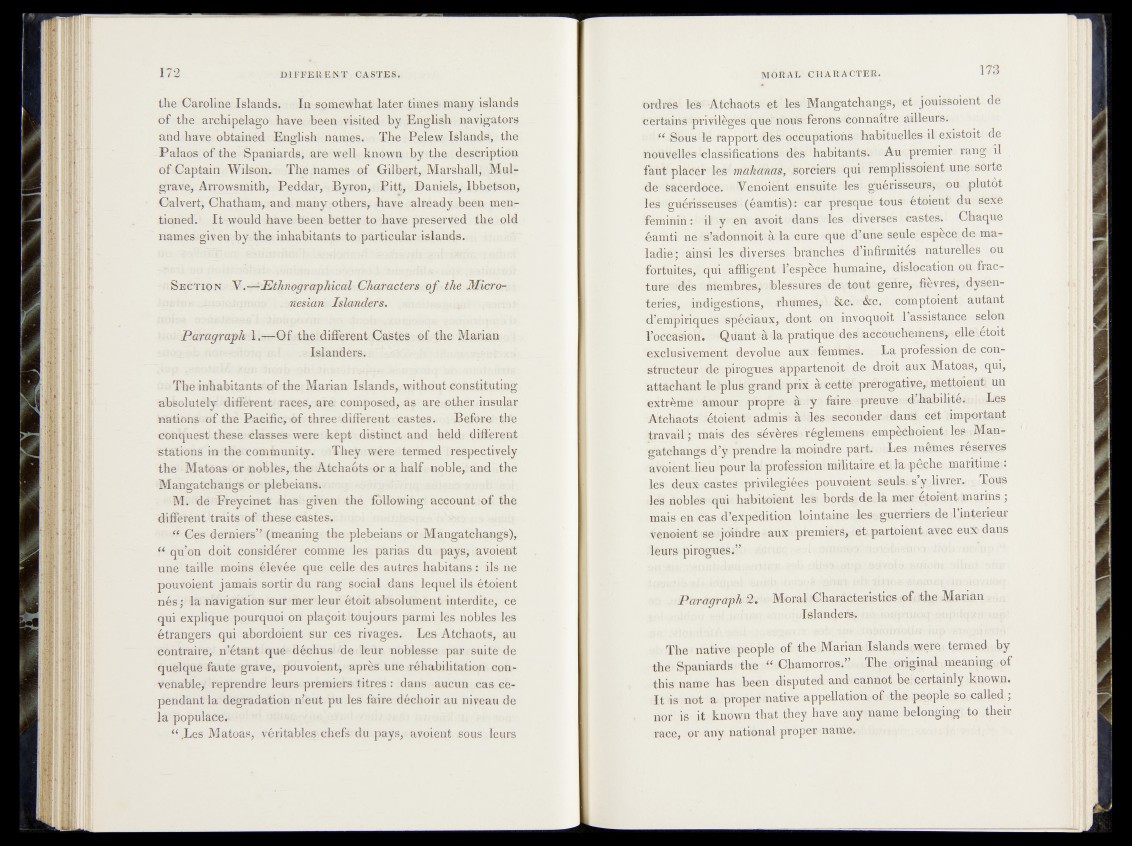
the Caroline Islands, Id somewhat later times many islands
of the archipelago have been visited b y English navigators
and have obtained English names. The Pelew Islands, the
Palaos of the Spaniards* are well known by thedescription
of Captain Wilson. The names of Gilbert, Marshall, Mul-
grave, Arrowsmith, Peddar, Byron, Pitt, Daniels* Ibhetson,
Calyert, Chatham, and many others, have already beea mentioned.
It would have been better to have preserved the old
names given by the inhabitants to particular islands.
Section V.—-Ethnographical Characters o f the Micro-
. nesian Islanders.
Paragraph 1 .---Of the different Castes of the Marian
• Islanders. ;
The inhabitants of the Marian Islands, without-constituting
abfeolute^ different races, areî composed* as are other insular
nationsiiof the Pacific, of ^MeeèdifF{areàfetteastee«nj[^BafeBeh^É
conquest these classes- were kept distinct and held dUerent
stations in the cominunity. - They were termed ; respectively
the Matoas or nobles, the Atchaots-or a half noble, and the
Mangatcharigs or plebeians.
M. 'dë Freycinet has given the following account :of the
different traits of these castes.
u Ces derniers” (meaning the plebeians or M angatchangs),
fe qir’on doit considérer comme les parias du pays, avoient
une taille moins élevée que celle des autres habitans : ils ne
pouvoient jamais sortir du rang social dans lequel ils étoient
nés f la navigation-sur-mer leur êtoit absolument interdite, ce
qui explique pourquoi on plaçoit toujours parmi les nobles les
étrangers qui abordoient sur ces riyages. Les Atchaots, au
contraire, n?étant : que- déchus1 *de leur noblesse par suite de
quelque faute grave, pouvoient* après une réhabilitation convenable/
reprendre leurs premiers, titres : dans -aucun cas cependant
la degradation n< eut pu les faire déchoir au niveau de
la populace,-
“ .Les Matoas, , véritables chefs du pays, avoient sous leurs
ordres« feS'A.tchaotset J les Mangatehangs, et jouissoient de
certains pTivilè^s^tie^nous- ferons^êonnaitre ailleurs.
^ “ -SouëTé rapport -dès occupations- habituelles il existoitode
nouvelles "clasèifiüatiÔUs! 1 dës 1 habitants* Au premier, rang-'il
horéiersj =qnb iempfeèoiént unepsôrfce
de sacerdoce.|yenbibhrifènf&uite ;<lesi« guérisseurs,- ott plutqt
de§a^^^§g(|^8es*i^amtfei^ndV-pfes^d!t®usi'6it^ien^ du sexe
féminin uvehiodansO^stadivéïseB.-jciasteât.t^'Ghaqne
éamti ne44dooü©itiàila>;eureH m Id ’nhe*; seule espèeeide maladie;
ainsi les diverses, branches d’infirmités naturellés où
fortuites, qui affligent l’espèce humaine, diélnçatiomou frac-
tutfë-’dés •A m f e ^ ièiMsùrèsodOvtoqéi'.gëàre,- Jfevreéj-iAy^n-
teries, indigestions, rhumes,/! &e. 'fee. .comptofent autant
d’empiriques spéciaux, dont on invoquoit 1 assistahce;s-selbn
Quant ddapratiqnéideëncèèuetemensyielléiil^it
exclusivement dévolue. aux ferainfes. La profession cfe con-
structéur-de pirogues appartenoit de, droit aux Matons, qui,
attachant fejplüsîgrand«prix à®ettb‘ praràgativeÿM,ett©if^h. un
oktrèmë-4moür; propra- à; firiEe?aprfiui®Hd’JSahihtiiL!lt'Lbs
Attehacat^toient admis? àislèss>s®dèiMeprdaud edt ihnpoj'teftt
tra v e l ^ mais des sévères régymeiasv
gàtchangs d ’ÿprendreda/moindre parfcj - 'fîi^ tm è lm ^ lêSÉfîSM
avoiênrilieti * pouf la profession! militaSse^etigjjjp
les deux- castes privilégiées pouvofenfedehlsns ygHgïfefi»ir^ TfiWS
^ Üûbtestqub habitefent le# b ead^deia J
mais qn cas d’expedition l^ntaiioet1te6s^Jferri«ilî<tojl5Bè«l^
vesoient «^jdMadaoe «au»t«pi^m^%dfef»rtpie»feiaive© dans
leurs pirogues/1’!-'
Paragraph &.1'>|^Moi^jGhaBicÉiæisthæ ofjjthjnMariân
Islandersi. »<
■ The native» people ofiîtheiMarian)Ts]Bi|ris$®^h;i tpymnd; by
the Spaniards the o^iCharnorrosifi, The.swriginaA<jproi>tagupf
•this name has been ,disputed and;cannot bejcerfeinlyknowm
I t is not a proper mativ® appellation o f the penpl%PQ; called ;
nor is it known th at they have anf*name b e lo n g ^ ) to „fhqir
race, or any national proper‘name» ) '